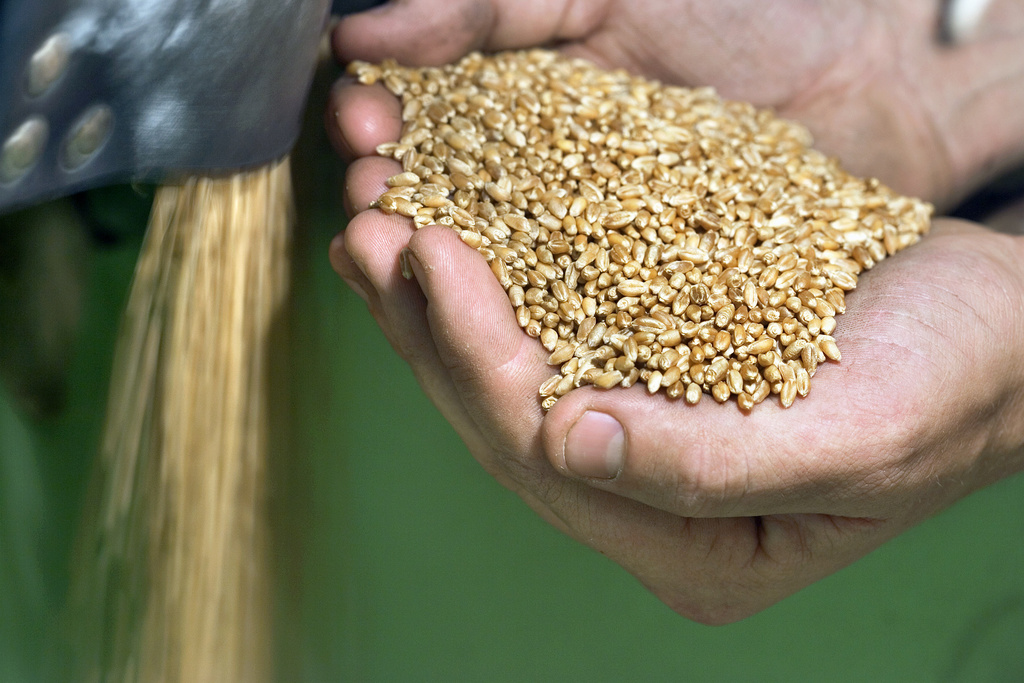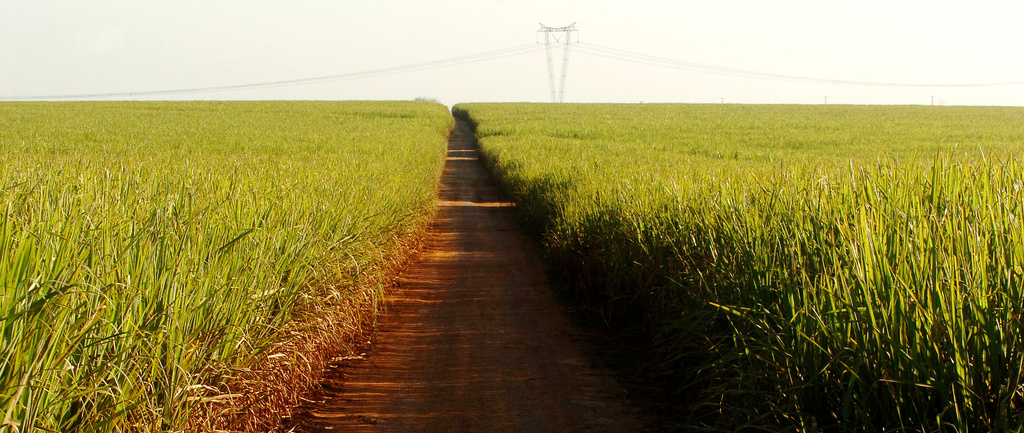Swiss farmers ask what’s for dinner in 2050

A trip to any Swiss grocery store shows that food is available in abundance – whether in the form of basics like bread and milk or more exotic fare such as pineapples.
However, the Swiss Farmers Association is concerned about Switzerland becoming too dependent upon foreign foodstuffs. At its annual media conference in Bern, the group looked ahead 40 years and called for the country to continue growing at least half of its own food.
“Thanks to its high purchasing power, Switzerland can buy whatever it can’t produce. But it’s important that we continue to grow our own food, and for that we need good land,” association president Hansjörg Walter told swissinfo.ch.
Currently, Swiss farmers produce about 60 per cent of the food for the country’s people and livestock. Yet this will become a challenge considering the growing population and the loss of farmland.
According to the association, Switzerland loses the equivalent of ten football fields a day to construction.
Land in sight?
To illustrate how infrastructure, industry and housing are eating up big chunks of Switzerland’s flat land, the conference was held at a dairy and grain farm just a short walk from Bern’s Westside shopping centre.
Farmer Andreas Zehnder displayed a series of photographs showing how civilisation had been creeping closer and closer to the fields of his family farm, which dates back to 1869.
“I’m convinced that the next big project will come along in 20 years,” said Zehnder, whose father helps him run the farm.
Zehnder and his wife work part time in other sectors to supplement their farming income. The average Swiss farmer earns only about SFr40,000 ($42,300) a year if he runs his own farm.
Seated on benches in Zehnder’s hayloft, the journalists could hear the rumble of trains passing by. “It’s cheaper to build on flat land, but we wish that more homes would be built on hillsides,” Walter pointed out.
Depriving others
The welfare of Swiss farmers and consumers was not the only topic addressed. Countries that are less well off than Switzerland also need to be considered, the association argued.
“What we import comes from a market, and then it’s missing from somewhere – probably from a poor place with low purchasing power. The food goes where the price is best,” Walter said.
Then there’s the issue of the water used to grow exotic fruit and vegetables consumed in Switzerland, even if the export country is low on water reserves. Desirable though it may be to have a vast selection of food on offer, it raises additional questions about the circumstances under which it was produced.
“How did the fish live in Vietnam, and how was it fed and killed? Was the production sustainable, or did it have a negative effect on the ecosystem?” said Walter. He said he didn’t want to speak badly of imports, and pointed out that some of the same questions could be posed of local food.
World view
Hans-Jörg Lehmann, head of the Swiss Permanent Representation to the Food and Agriculture Organization in Rome, said he was worried that people were not taking the topic of food supplies seriously enough.
“It’s not only the land issue or food safety; it’s the whole issue in relation to collaboration with other countries – in particular with the developing world and the farmers and consumers there. My concern is that we don’t do enough,” Lehmann told swissinfo.ch.
To demonstrate how farmers at home and abroad were often in the same boat, Lehmann shared slides showing how bluetongue disease had spread from Africa to Europe.
He mentioned that Switzerland could help other nations by sharing its know-how in relation to mountain farming techniques and subsidies paid to Swiss farmers for adopting government-approved practices.
Lehmann has a firm goal in mind, both for today and 2050:
“At all times, everyone must have unrestricted access to enough safe and varied food at a price they can afford.”
The year 2010 had its share of ups and downs for Swiss farmers. The season began late and there was a lot of wet weather in spring and early summer – which made it hard to produce animal feed and wheat.
The sunny autumn was ideal for the ripening of apples, pears and grapes; potato and sugar beet harvests were good as well.
Meat production was less favourable, with the exception of poultry. The pig farmers raised too much livestock, so pork prices were extremely low.
Dairy farmers struggled with supply and demand issues while calling for better milk prices. The weak euro had an impact on cheese exports, and there was a surplus of butter.
Overall, the production value sank by 3.3% to SFr10,343 billion. Meanwhile, farmers’ incomes went down by as much as 6%.
Source: Swiss Farmers Association

In compliance with the JTI standards
More: SWI swissinfo.ch certified by the Journalism Trust Initiative













You can find an overview of ongoing debates with our journalists here . Please join us!
If you want to start a conversation about a topic raised in this article or want to report factual errors, email us at english@swissinfo.ch.